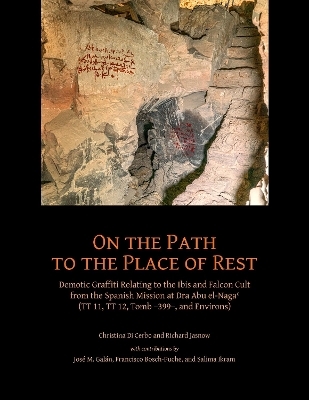
On the Path to the Place of Rest
Demotic Graffiti relating to the Ibis and Falcon Cult from the Spanish-Egyptian Mission at Dra Abu el-Naga (TT 11, TT 12, TT 399 and Environs)
Seiten
2022
Lockwood Press (Verlag)
978-1-948488-41-9 (ISBN)
Lockwood Press (Verlag)
978-1-948488-41-9 (ISBN)
- Titel nicht im Sortiment
- Artikel merken
This volume publishes 92 Demotic graffiti, along with several ostraca and mummy bandages, from Theban Tombs at Dra Abu el-Naga, studied under the Spanish Mission directed by Jose Galan. In an introductory chapter Galan discusses the work at Dra Abu Naga and recounts the history of this area of the Theban Necropolis down to the Roman period.
In this volume Christina Di Cerbo and Richard Jasnow publish 92 Demotic graffiti, along with several ostraca and mummy bandages, from Theban Tombs 11, 12, Tomb -399-, and environs recorded and studied under the aegis of the Spanish Mission at Dra Abu el-Naga directed by Jose Galan.
These texts from the mid-second century BCE were inscribed on the tomb walls by workers of the Ibis and Falcon cult, who used the New Kingdom tombs as burial places for mummified birds dedicated to the gods Thoth and Horus. This varied corpus of texts includes not only votive formulae and lists of names, but, most unusually, labels for chambers and halls to guide the men depositing the mummies through the labyrinthine catacombs. The cult workers also recorded important burials and memorialized events of special significance, as when a massive conflagration broke out that consumed several mummies and damaged the tomb walls.
The Mission's conservators recovered many hitherto virtually invisible graffiti. Numerous inscriptions posed daunting epigraphic challenges; the text editors employed computer applications, especially DStretch, in order to enhance the digital images forming the basis for decipherment.
In an introductory chapter Galan discusses the work of the Spanish Mission at Dra Abu Naga and recounts the complicated history of this important area of the Theban Necropolis down to the Roman period. The graffiti illustrate how New Kingdom tombs were reused for the sacred animal cult in the Ptolemaic period. Francisco Bosch-Puche and Salima Ikram contribute a detailed chapter analysing the archaeological context of the graffiti and the material evidence for the animal cult in the site. The volume, a holistic study of this area at the twilight of Pharaonic history, represents a true collaboration between archaeologists and philologists.
In this volume Christina Di Cerbo and Richard Jasnow publish 92 Demotic graffiti, along with several ostraca and mummy bandages, from Theban Tombs 11, 12, Tomb -399-, and environs recorded and studied under the aegis of the Spanish Mission at Dra Abu el-Naga directed by Jose Galan.
These texts from the mid-second century BCE were inscribed on the tomb walls by workers of the Ibis and Falcon cult, who used the New Kingdom tombs as burial places for mummified birds dedicated to the gods Thoth and Horus. This varied corpus of texts includes not only votive formulae and lists of names, but, most unusually, labels for chambers and halls to guide the men depositing the mummies through the labyrinthine catacombs. The cult workers also recorded important burials and memorialized events of special significance, as when a massive conflagration broke out that consumed several mummies and damaged the tomb walls.
The Mission's conservators recovered many hitherto virtually invisible graffiti. Numerous inscriptions posed daunting epigraphic challenges; the text editors employed computer applications, especially DStretch, in order to enhance the digital images forming the basis for decipherment.
In an introductory chapter Galan discusses the work of the Spanish Mission at Dra Abu Naga and recounts the complicated history of this important area of the Theban Necropolis down to the Roman period. The graffiti illustrate how New Kingdom tombs were reused for the sacred animal cult in the Ptolemaic period. Francisco Bosch-Puche and Salima Ikram contribute a detailed chapter analysing the archaeological context of the graffiti and the material evidence for the animal cult in the site. The volume, a holistic study of this area at the twilight of Pharaonic history, represents a true collaboration between archaeologists and philologists.
Christina Di Cerbo is an Egyptologist at the Epigraphic Survey of the University of Chicago Richard Jasnow is professor of Egyptology at Johns Hopkins University
| Erscheinungsdatum | 23.06.2021 |
|---|---|
| Verlagsort | Atlanta |
| Sprache | englisch |
| Maße | 216 x 279 mm |
| Themenwelt | Geisteswissenschaften ► Archäologie |
| Geschichte ► Allgemeine Geschichte ► Vor- und Frühgeschichte | |
| Geschichte ► Allgemeine Geschichte ► Altertum / Antike | |
| ISBN-10 | 1-948488-41-8 / 1948488418 |
| ISBN-13 | 978-1-948488-41-9 / 9781948488419 |
| Zustand | Neuware |
| Informationen gemäß Produktsicherheitsverordnung (GPSR) | |
| Haben Sie eine Frage zum Produkt? |
Mehr entdecken
aus dem Bereich
aus dem Bereich
Was Pompeji über uns erzählt
Buch | Hardcover (2023)
Propyläen (Verlag)
32,00 €
auf den Spuren der frühen Zivilisationen
Buch | Hardcover (2023)
C.H.Beck (Verlag)
20,00 €


